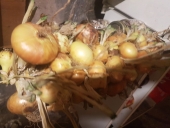








Pete Shield, Domaine de Montrouch, French Occupied Occitania
http://www.montrouchorganic.com
 1
1




Idle dreamer








Alan Whitaker wrote:I've always stored my seed in a freezer. I have a 10 Cu.Ft. freezer full of seed right now. But I would like to get away from having to rely on electricity. I'm in NE TX where it is hot and humid during the summer and wet in the winter. I've tried storing seed without the freezer before, but after a couple of years, the seed usually won't germinate. I have onion seed that I've stored in the freezer for 9 years that still has decent germination rates. Anyhow, how would one store garden seed in this climate (hot, humid) without the use of electricity? I want to store for years, not year to year. Sometimes, I just can't get it all planted and I like to grow out different varieties and save seed, so I'm usually just growing one variety of each. So what is the latest and best way to do this?
"Limitation is the mother of good management", Michael Evanari
Location: Southwestern Oregon (Jackson County), Zone 7




from http://www.seedcontainers.net/a_guide_to_long-term_seed_preservation.html
The colour usually shown by silica gel is due to an indicator, added to see directly when it is dehydrated and when it has absorbed moisture. For many years, cobalt chloride (Cl2Co) has been used. This substance gives the dehydrated gel a strong blue colour and a pale pink colour to the gel having absorbed moisture. Recently, the European Union banned its use because of considering it carcinogen through inhalation. A search for new alternatives led to some iron salts, where the change in colour can be poorly distinguished. At present, the most advisable alternative is methyl violet, which gives the dehydrated gel an orange colour and a green colour to the hydrated gel.




"Limitation is the mother of good management", Michael Evanari
Location: Southwestern Oregon (Jackson County), Zone 7




Seed the Mind, Harvest Ideas.
http://farmwhisperer.com




 . After 10-15 years, germination is less, but it's no problem at all after 5 years.
. After 10-15 years, germination is less, but it's no problem at all after 5 years.
 . I did find bugs in one paper bag this year (10-15 years old), so I will be more consistent about putting them in containers now.
. I did find bugs in one paper bag this year (10-15 years old), so I will be more consistent about putting them in containers now.




Our projects:
in Portugal, sheltered terraces facing eastwards, high water table, uphill original forest of pines, oaks and chestnuts. 2000m2
in Iceland: converted flat lawn, compacted poor soil, cold, windy, humid climate, cold, short summer. 50m2




"You may never know what results come of your action, but if you do nothing there will be no result”
How Permies.com Works
Be Nice








Kent

|
And when my army is complete, I will rule the world! But, for now, I'm going to be happy with this tiny ad:
Our PIE page has been updated, anybody wanna test?
https://permies.com/t/369340/PIE-page-updated-wanna-test
|




